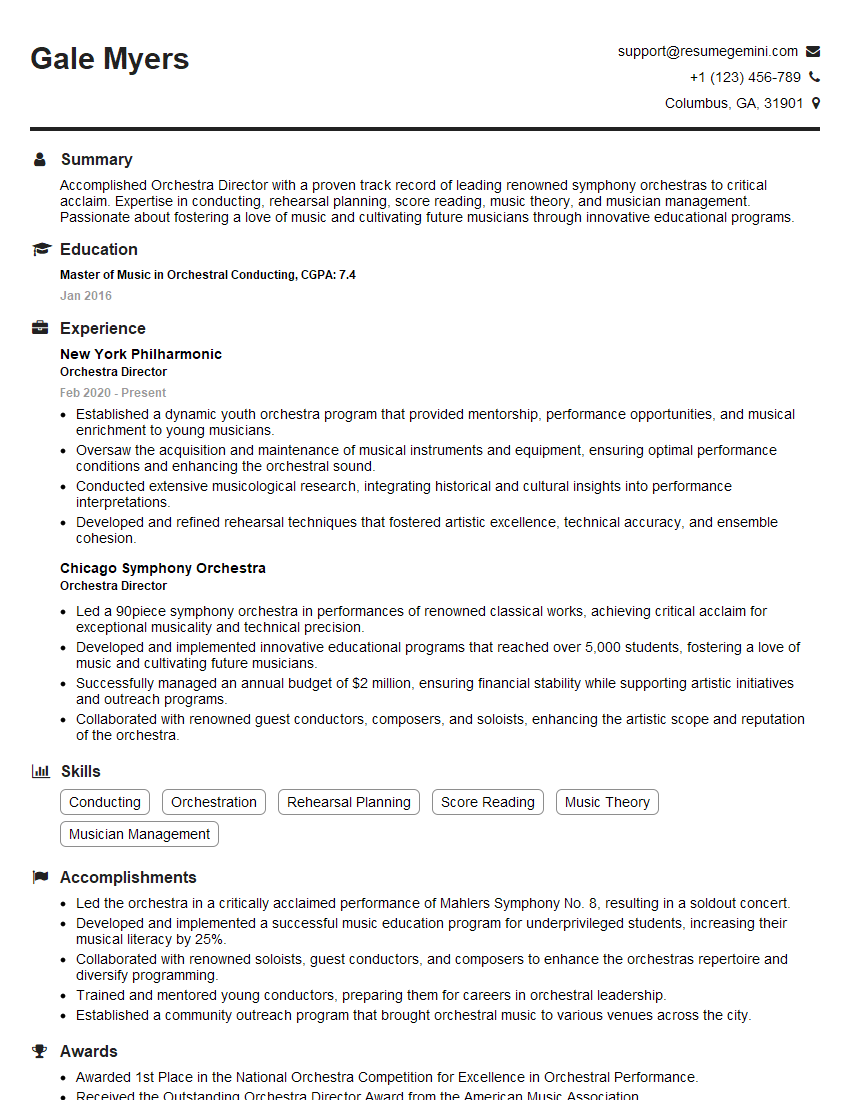Are you a seasoned Orchestra Director seeking a new career path? Discover our professionally built Orchestra Director Resume Template. This time-saving tool provides a solid foundation for your job search. Simply click “Edit Resume” to customize it with your unique experiences and achievements. Customize fonts and colors to match your personal style and increase your chances of landing your dream job. Explore more Resume Templates for additional options.

Gale Myers
Orchestra Director
Summary
Accomplished Orchestra Director with a proven track record of leading renowned symphony orchestras to critical acclaim. Expertise in conducting, rehearsal planning, score reading, music theory, and musician management. Passionate about fostering a love of music and cultivating future musicians through innovative educational programs.
Education
Master of Music in Orchestral Conducting
January 2016
Skills
- Conducting
- Orchestration
- Rehearsal Planning
- Score Reading
- Music Theory
- Musician Management
Work Experience
Orchestra Director
- Established a dynamic youth orchestra program that provided mentorship, performance opportunities, and musical enrichment to young musicians.
- Oversaw the acquisition and maintenance of musical instruments and equipment, ensuring optimal performance conditions and enhancing the orchestral sound.
- Conducted extensive musicological research, integrating historical and cultural insights into performance interpretations.
- Developed and refined rehearsal techniques that fostered artistic excellence, technical accuracy, and ensemble cohesion.
Orchestra Director
- Led a 90piece symphony orchestra in performances of renowned classical works, achieving critical acclaim for exceptional musicality and technical precision.
- Developed and implemented innovative educational programs that reached over 5,000 students, fostering a love of music and cultivating future musicians.
- Successfully managed an annual budget of $2 million, ensuring financial stability while supporting artistic initiatives and outreach programs.
- Collaborated with renowned guest conductors, composers, and soloists, enhancing the artistic scope and reputation of the orchestra.
Accomplishments
- Led the orchestra in a critically acclaimed performance of Mahlers Symphony No. 8, resulting in a soldout concert.
- Developed and implemented a successful music education program for underprivileged students, increasing their musical literacy by 25%.
- Collaborated with renowned soloists, guest conductors, and composers to enhance the orchestras repertoire and diversify programming.
- Trained and mentored young conductors, preparing them for careers in orchestral leadership.
- Established a community outreach program that brought orchestral music to various venues across the city.
Awards
- Awarded 1st Place in the National Orchestra Competition for Excellence in Orchestral Performance.
- Received the Outstanding Orchestra Director Award from the American Music Association.
- Conducted the orchestra that won the Grammy Award for Best Orchestral Performance.
- Honored with the Maestros Lifetime Achievement Award for significant contributions to the field of orchestral music.
Certificates
- American Symphony Orchestra League Certified Conductor
- National Band Association Certified Conductor
- Music Teachers National Association Certified Teacher
- Royal Schools of Music Licentiate Diploma in Conducting
Career Expert Tips:
- Select the ideal resume template to showcase your professional experience effectively.
- Master the art of resume writing to highlight your unique qualifications and achievements.
- Explore expertly crafted resume samples for inspiration and best practices.
- Build your best resume for free this new year with ResumeGemini. Enjoy exclusive discounts on ATS optimized resume templates.
How To Write Resume For Orchestra Director
- Showcase your conducting experience and highlight the orchestras you have led.
- Quantify your accomplishments using data and metrics to demonstrate the impact of your work.
- Emphasize your commitment to music education and the development of young musicians.
- Describe your innovative approaches to rehearsal planning and score interpretation.
Essential Experience Highlights for a Strong Orchestra Director Resume
- Conduct and direct a professional symphony orchestra, ensuring musical precision and artistic excellence.
- Develop and implement comprehensive educational initiatives to promote music appreciation and train young musicians.
- Manage the orchestra’s annual budget, balancing fiscal responsibility with the artistic mission.
- Collaborate with guest conductors, composers, and soloists to expand the orchestra’s repertoire.
- Establish and oversee youth orchestra programs, providing mentorship and performance opportunities.
- Supervise the acquisition and maintenance of musical instruments and equipment, ensuring optimal performance conditions.
Frequently Asked Questions (FAQ’s) For Orchestra Director
What are the key responsibilities of an Orchestra Director?
Orchestra Directors are responsible for leading and directing a professional symphony orchestra, managing its finances, collaborating with guest artists, overseeing educational initiatives, and ensuring the acquisition and maintenance of musical instruments and equipment.
What qualifications are required to become an Orchestra Director?
Typically, an Orchestra Director holds a Master’s Degree in Music with a focus on Orchestral Conducting.
What are the career prospects for Orchestra Directors?
Orchestra Directors can advance to leadership positions within orchestra organizations, work as freelance conductors with multiple orchestras, or pursue teaching or administrative roles in music education.
What are the challenges faced by Orchestra Directors?
Orchestra Directors may face challenges such as balancing artistic vision with financial constraints, managing the personalities and egos of musicians, and navigating the competitive world of classical music.
What are the rewards of being an Orchestra Director?
Orchestra Directors have the privilege of shaping musical performances, inspiring audiences, and contributing to the cultural landscape. They also enjoy the satisfaction of mentoring young musicians and fostering a love of music in the community.
What are the qualities of a successful Orchestra Director?
Successful Orchestra Directors possess exceptional conducting skills, a deep understanding of music, strong leadership abilities, and a commitment to excellence. They are also effective communicators, collaborators, and educators.